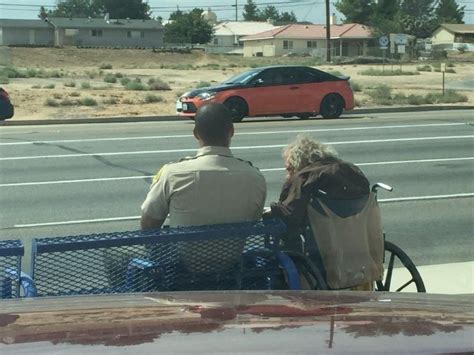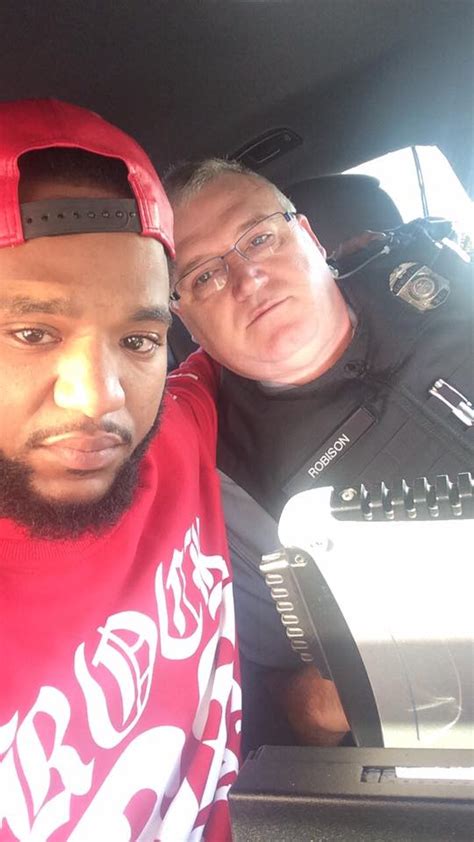
A speeding driver in Spotsylvania County, Virginia, received an unexpected act of kindness from a sheriff’s deputy who, instead of issuing a ticket, offered words of encouragement and a prayer, a gesture captured on video and now circulating widely online.
Spotsylvania County, VA – A Spotsylvania County Sheriff’s deputy’s compassionate response to a speeding driver has garnered widespread attention after a video of the encounter was posted online. Instead of issuing a speeding ticket, the deputy chose to offer words of encouragement, listen to the driver’s situation, and offer a prayer, leaving a lasting impression on both the driver and the online community. The incident, which occurred recently, highlights the discretion law enforcement officers have and the potential for positive interactions even during traffic stops.
The video, initially shared on social media platforms, quickly went viral, attracting comments and shares from users across the country. Many praised the deputy’s empathetic approach, contrasting it with more rigid enforcement practices often associated with traffic violations. According to the Spotsylvania County Sheriff’s Office, the deputy’s actions reflect the department’s broader philosophy of community policing and building positive relationships with the public. The Sheriff’s office released a statement acknowledging the incident, stating that the deputy’s conduct aligns with the department’s values and commitment to serving the community with compassion and understanding.
The driver, whose identity has not been officially released, was reportedly exceeding the speed limit on a local road. Upon being pulled over, the driver explained to the deputy the circumstances that led to the speeding, citing personal challenges and anxieties. The deputy, demonstrating remarkable patience and empathy, listened attentively to the driver’s explanation. Rather than immediately issuing a ticket, the deputy engaged in a conversation, offering words of support and understanding.
“The deputy could have easily issued a speeding ticket,” noted a spokesperson for the Spotsylvania County Sheriff’s Office. “But he recognized the driver was going through a difficult time and chose to respond with compassion. This is the kind of policing we strive for – where our deputies are not just enforcers of the law but also counselors and community partners.”
The video shows the deputy engaging in a brief but heartfelt prayer with the driver. The prayer, which focused on providing strength and guidance, resonated deeply with many viewers. Several commented on the video, expressing appreciation for the deputy’s willingness to incorporate faith into his interaction with the public. Legal experts note that such actions are generally permissible as long as they do not constitute coercion or discrimination.
The incident also sparked a broader discussion about the role of law enforcement in society. Some commentators argued that the deputy’s actions represent a positive shift towards more community-oriented policing, while others maintained that traffic laws should be strictly enforced regardless of individual circumstances.
“There’s always a balance to be struck between enforcing the law and showing compassion,” said Dr. Emily Carter, a professor of criminology at the University of Virginia. “In this case, the deputy appears to have made a judgment call that prioritized the well-being of the individual over strict adherence to the rules. While not every situation warrants such leniency, it’s a reminder that law enforcement officers have the discretion to act in ways that promote healing and understanding.”
The incident in Spotsylvania County is not unique. Across the country, there have been similar instances of law enforcement officers going above and beyond the call of duty to help individuals in need. These acts of kindness, often captured on video and shared on social media, serve as powerful reminders of the human side of policing.
The Spotsylvania County Sheriff’s Office emphasized that while the deputy’s actions were commendable, they do not represent a change in the department’s overall enforcement policies. Speeding remains a serious traffic violation, and deputies are expected to enforce the law consistently and fairly. However, the incident does highlight the department’s commitment to training its officers in de-escalation techniques and encouraging them to exercise discretion when appropriate.
“We want our deputies to be problem-solvers, not just ticket-writers,” said Sheriff Roger Harris in a statement. “That means taking the time to understand the circumstances behind each situation and responding in a way that is both fair and compassionate.”
The deputy involved in the incident has not been publicly identified, and the Spotsylvania County Sheriff’s Office has declined to release his name, citing privacy concerns. However, the department confirmed that the deputy has received positive feedback from both within the department and from the community. The deputy himself has reportedly expressed gratitude for the opportunity to make a positive impact on someone’s life.
The viral video has also prompted discussions about the potential for increased accountability and transparency in law enforcement. Body cameras and dashboard cameras are becoming increasingly common, providing a record of interactions between officers and the public. These recordings can be used to both hold officers accountable for misconduct and to showcase examples of exemplary behavior, as in the case of the Spotsylvania County deputy.
“Body cameras are a valuable tool for promoting transparency and building trust between law enforcement and the community,” said Maria Hernandez, a civil rights attorney. “When officers know they are being recorded, they are more likely to act professionally and respectfully. And when the public has access to these recordings, they can see for themselves how officers are conducting themselves.”
The incident also raises questions about the role of faith in public life. While the deputy’s prayer was well-received by many, some have questioned whether it is appropriate for a law enforcement officer to engage in religious activities while on duty. Legal experts point out that the First Amendment protects both the freedom of speech and the freedom of religion, but it also prohibits government endorsement of religion.
“The key issue is whether the deputy’s actions constituted an endorsement of religion,” said Professor David Miller, a constitutional law expert. “If the prayer was voluntary and non-coercive, it is unlikely to be considered a violation of the Establishment Clause. However, if the deputy had pressured the driver to participate in the prayer, or if the prayer had been explicitly sectarian, it could raise constitutional concerns.”
The Spotsylvania County Sheriff’s Office has stated that it respects the religious freedom of both its employees and the public. The department’s policies allow deputies to engage in personal religious practices while on duty, as long as those practices do not interfere with their job responsibilities or violate the rights of others.
The story of the Spotsylvania County deputy has resonated with people from all walks of life, offering a glimmer of hope in a time of division and conflict. It serves as a reminder that even in the midst of enforcing the law, there is always room for compassion, understanding, and human connection.
Expanded Context and Analysis
The viral incident involving the Spotsylvania County deputy and the speeding driver touches upon several key themes relevant to contemporary discussions about law enforcement, community relations, and the role of compassion in public service. To fully understand the significance of this event, it’s crucial to delve deeper into the various aspects it highlights.
1. The Discretionary Power of Law Enforcement:
One of the most important takeaways from this incident is the recognition that law enforcement officers possess a significant amount of discretion in how they enforce the law. While laws provide a framework for acceptable behavior, officers on the ground must often make judgment calls based on the specific circumstances of each situation. This discretion extends to a wide range of decisions, including whether to issue a warning or a ticket, whether to make an arrest, and how to respond to individuals in distress.
The deputy in Spotsylvania County exercised his discretion by choosing to prioritize the driver’s emotional well-being over strict adherence to the speeding law. This decision reflects a growing awareness within law enforcement agencies of the importance of de-escalation techniques and trauma-informed policing. These approaches emphasize the need to understand the underlying causes of behavior and to respond in a way that minimizes harm and promotes healing.
However, the exercise of discretion can also be controversial. Critics argue that it can lead to inconsistencies in enforcement, potentially resulting in biases and discriminatory practices. It’s essential that law enforcement agencies provide clear guidelines and training to ensure that officers exercise their discretion fairly and equitably.
2. The Role of Community Policing:
The incident aligns with the principles of community policing, a philosophy that emphasizes building positive relationships between law enforcement and the communities they serve. Community policing seeks to move beyond a purely reactive approach to crime, focusing instead on proactive strategies that address the root causes of crime and disorder.
Key elements of community policing include:
- Partnerships: Collaborating with community members, organizations, and other stakeholders to identify and solve problems.
- Problem-Solving: Using data and analysis to understand the underlying causes of crime and disorder and to develop targeted interventions.
- Community Engagement: Building trust and rapport with residents through regular communication, outreach events, and community meetings.
The deputy’s compassionate response to the speeding driver exemplifies the spirit of community policing. By taking the time to listen to the driver’s concerns and offer support, the deputy strengthened the bond between law enforcement and the community. This type of interaction can help to build trust, reduce fear, and encourage residents to cooperate with law enforcement in addressing crime and other community problems.
3. The Humanization of Law Enforcement:
The viral video of the Spotsylvania County deputy has served to humanize law enforcement in the eyes of many viewers. Often, law enforcement officers are portrayed as impersonal enforcers of the law, focused solely on issuing tickets and making arrests. The deputy’s act of kindness challenged this stereotype, reminding people that law enforcement officers are also human beings with empathy and compassion.
This humanization of law enforcement can have several positive effects:
- Improved Public Perception: When people see law enforcement officers as compassionate and caring, they are more likely to view them positively.
- Increased Cooperation: Trust and respect are essential for fostering cooperation between law enforcement and the community.
- Reduced Conflict: When officers approach interactions with empathy and understanding, they are more likely to de-escalate situations and avoid unnecessary conflict.
4. The Intersection of Faith and Public Service:
The deputy’s prayer with the driver raises complex questions about the role of faith in public service. While the First Amendment protects both the freedom of speech and the freedom of religion, it also prohibits government endorsement of religion. It’s essential that law enforcement officers respect the religious diversity of the communities they serve and avoid imposing their own religious beliefs on others.
In this case, the Spotsylvania County Sheriff’s Office has stated that the deputy’s actions were consistent with the department’s policies on religious freedom. The department allows deputies to engage in personal religious practices while on duty, as long as those practices do not interfere with their job responsibilities or violate the rights of others.
However, it’s important to recognize that the issue of faith in public service can be sensitive and controversial. Law enforcement agencies should provide clear guidelines and training to ensure that officers understand the legal and ethical boundaries of religious expression.
5. The Impact of Social Media on Public Discourse:
The viral nature of the Spotsylvania County incident highlights the power of social media to shape public discourse about law enforcement. Social media platforms can amplify both positive and negative stories about law enforcement, potentially influencing public opinion and shaping policy decisions.
While social media can be a valuable tool for promoting transparency and accountability, it can also be used to spread misinformation and promote biased narratives. It’s essential to critically evaluate information shared on social media and to seek out diverse perspectives on complex issues.
6. The Need for Systemic Reform:
While the deputy’s act of kindness is commendable, it’s important to recognize that individual acts of compassion cannot solve systemic problems within law enforcement. To truly address issues of police brutality, racial bias, and lack of accountability, comprehensive reforms are needed.
These reforms may include:
- Improved Training: Providing officers with more training in de-escalation techniques, crisis intervention, and implicit bias awareness.
- Independent Investigations: Establishing independent bodies to investigate allegations of police misconduct.
- Community Oversight: Creating community oversight boards to provide input on law enforcement policies and practices.
- Data Collection and Analysis: Collecting and analyzing data on police stops, arrests, and use of force to identify patterns of bias and discrimination.
FAQ (Frequently Asked Questions):
-
What exactly happened in the viral video involving the Spotsylvania County deputy?
A Spotsylvania County Sheriff’s deputy pulled over a driver for speeding but, instead of issuing a ticket, offered words of encouragement, listened to the driver’s explanation for speeding, and offered a prayer. The interaction was captured on video and shared online, where it quickly went viral.
-
Why didn’t the deputy issue a speeding ticket?
The deputy reportedly recognized that the driver was going through a difficult time and chose to respond with compassion rather than strict enforcement of the speeding law. The deputy listened to the driver’s explanation and offered support.
-
Is it appropriate for a law enforcement officer to offer a prayer to a citizen during a traffic stop?
Legal experts say such actions are generally permissible as long as they do not constitute coercion or discrimination. The Spotsylvania County Sheriff’s Office stated that it respects the religious freedom of both its employees and the public, and their policies allow deputies to engage in personal religious practices while on duty, as long as those practices do not interfere with their job responsibilities or violate the rights of others. The key is whether the prayer was voluntary and non-coercive.
-
What has been the reaction to the video?
The video has received widespread attention and has sparked mixed reactions. Many praised the deputy’s empathetic approach and saw it as an example of community policing. Others argued that traffic laws should be strictly enforced regardless of individual circumstances and questioned the appropriateness of the prayer.
-
What does the Spotsylvania County Sheriff’s Office say about the incident?
The Spotsylvania County Sheriff’s Office acknowledged the incident and stated that the deputy’s conduct aligns with the department’s values and commitment to serving the community with compassion and understanding. They emphasized that while the deputy’s actions were commendable, they do not represent a change in the department’s overall enforcement policies. Speeding remains a serious traffic violation, and deputies are expected to enforce the law consistently and fairly but they also want their deputies to be problem-solvers.
Conclusion
The case of the Spotsylvania County deputy and the speeding driver offers a multifaceted perspective on law enforcement in the 21st century. While the deputy’s act of kindness has been lauded as a testament to the potential for compassion within the system, it also raises critical questions about the balance between enforcing the law and exercising discretion, the role of community policing, the humanization of law enforcement, the place of faith in public service, and the impact of social media on shaping public narratives. The incident serves as a valuable case study for law enforcement agencies, policymakers, and the public as they continue to grapple with the challenges and opportunities of building safer, more just, and more equitable communities. It underscores the necessity for ongoing dialogue, systemic reforms, and a commitment to fostering positive relationships between law enforcement and the diverse populations they serve. The narrative, amplified by the reach of social media, encourages reflection on the values we prioritize in law enforcement and the kind of interactions we strive to cultivate between officers and the public. The deputy’s actions, whether seen as a heartwarming deviation from protocol or a model for future interactions, have undoubtedly left a lasting impression on the driver and the broader community, prompting important conversations about the role of compassion and understanding in law enforcement.









